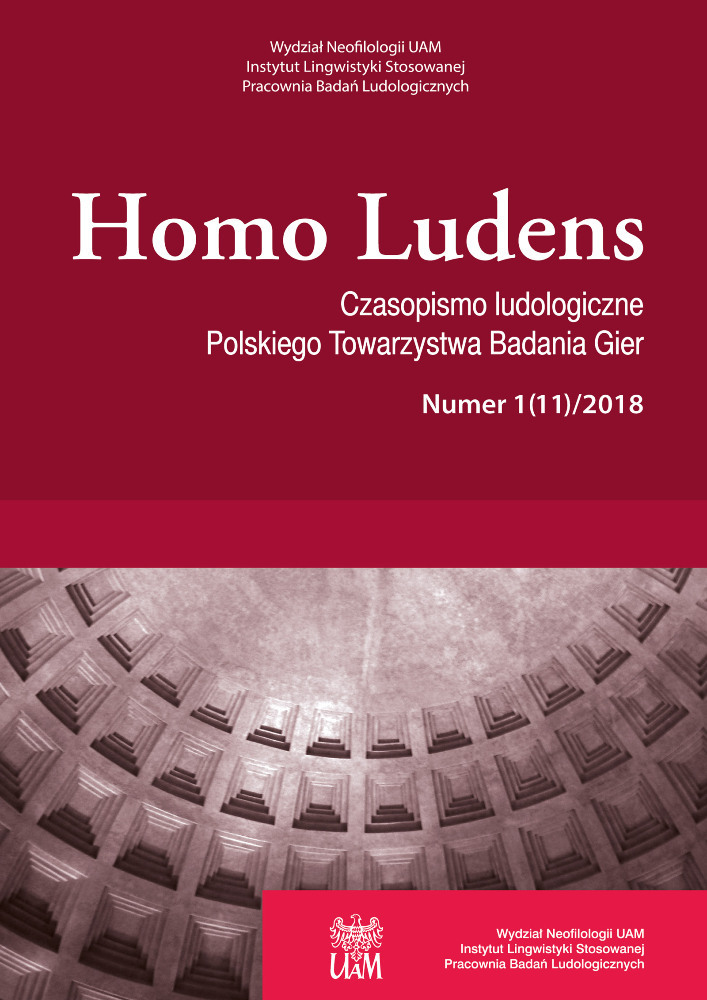Abstract
Beyond entertainment functions, board games can perform the essential functions of education. There are many games which, in addition to shaping social competences or logical thinking, reasoning and planning, can provide knowledge and expertise to help with natural sciences (physics, chemistry, biology, earth science). In the learning of these subjects there are many problems associated with understanding the content, often new or abstract, and how it is related to students’ existing knowledge. It is also important to transfer the knowledge about the operation and the principles governing science. A rich pool of titles with various mechanical and difficulty levels allows using the games as a teaching tool in the classroom, and crucially, outside it.References
Alpim, V. S. S., Santos, J. B., Silva, J. S. J., Menezes, T. D. C., Amorim, R., Ladeia, B. T. C., Marques, H., Queiroz, L. B., Gandra, M. (2009). Enigma: A Board Game As A Potential Tool For Biochemistry And Microbiology Learning And Integration. Journal of Biochemistry Education, 7(2), 7. DOI: https://doi.org/10.16923/reb.v7i2.191
Bentley, N. (2 listopada 2011). Zendo as a tool for teaching the scientific method. Online: https://nickbentleygames.wordpress.com/2011/11/02/zendo-as-a-tool-for-teaching-the-scientific-method.
Bochennek, K., Wittekindt, B., Zimmermann, S. Y., Klingebiel, T. (2007). More than mere games: A review of card and board games for medical education. Medical Teacher, 29(9), 941–948. DOI: https://doi.org/10.1080/01421590701749813
Dartigues, J. F., Foubert-Samier, A., Le Goff, M., Viltard, M., Amieva, H., Orgogozo, J. M., Barberger-Gateau, P., Helmer, C. (2013). Playing board games, cognitive decline and dementia: A French population-based cohort study. BMJ Open, 3(8). Online: https://bmjopen.bmj.com/content/3/8/e002998. DOI: https://doi.org/10.1136/bmjopen-2013-002998
Firmhofer, R. (2011). W szkole czy poza szkołą? Jak uczymy się w epoce postindustrialnej? W: P. Zbieranek (red.), Jak wykorzystać potencjał edukacji pozaszkolnej w Polsce? Gdańsk: Instytut Badań nad Gospodarką Rynkową. Online http://biblioteka-krk.ibe.edu.pl/opac_css/doc_num.php?explnum_id=209
Forsthuber, B., Motiejūnaitė, A., de Almeida Coutinho, A. S., Baïdak,N.,'Horvath, A. (2011). Nauczanie przedmiotów ścisłych i przyrodniczych w Europie. Polityka, praktyka i badania naukowe (tłum. J. Czernik). Warszawa: Fundacja Rozwoju Systemu Edukacji. Online: https://publications.europa.eu/pl/publication-detail/-/publication/bae53054-c26c-4c9f-8366-5f95e2187634/language-pl.
Gobet, F., de Voogt, A., Retschitzki, J. (2012). Moves in Mind. The Psychology of Board Games. Hove: Psychology Press.
Hamm, S., Robertson, I. (2010). Preferences for deep-surface learning: A vocational education case study using a multimedia assessment activity. Australasian Journal of Educational Technology, 26(7), 951–965.Online: https://ajet.org.au/index.php/AJET/article/view/1027/288. DOI: https://doi.org/10.14742/ajet.1027
Jarvis, M. (2005). Psychology of Effective Learning and Teaching. Cheltenham: Nelson Thornes.
Korolczuk, R., Zambrowska, M. (2014). Pozwólmy dzieciom grać. O wykorzystaniu gier planszowych w edukacji matematycznej. Warszawa: Instytut Badań Edukacyjnych.
Krzyżanowska, Ł., Wiśnicka, M. (2009). Wykorzystanie eksperymentów i metod aktywizujących w nauczaniu – problemy i wyzwania. Raport z badań. Online: http://www.kopernik.org.pl/fileadmin/user_upload/PROJEKTY_SPECJALNE/InterakcjaIntegracja/2009/sesja1raport_nauczyciele_konferencja_prasowa_14_10_09.pdf.
Leemkuil, H., de Jong, T., Ootes, S. (wrzesień 2000). Review of educational use of games and simulations. Online: https://ris.utwente.nl/ws/files/5156063/review_of_educational.pdf.
Linderoth, J. (2011). Exploring Anonymity in Cooperative Board Games. W: Proceedings of DiGRA Conference: Think Design Play. Online: http://www.digra.org/wp-content/uploads/digital-library/11312.15167.pdf. DOI: https://doi.org/10.26503/dl.v2011i1.535
Lowe, N. K. (1988). Games and toys in the teaching of science and technology. Online: http://unesdoc.unesco.org/images/0008/000805/080586e.pdf.
Matorin, A. I., McNamara, J. R. (1996). Using board games in therapy with children. International Journal of Play Therapy, 5(2), 3–16. DOI: https://doi.org/10.1037/h0089022
Mayer, B., Harris, C. (2010). Libraries Got Games: Aligned Learning through Modern Board Games. Chicago: American Library Association.
Ramani, G. B., Siegler, R. S., Hitti, A. (2012). Taking It to the Classroom: Number Board Games as a Small Group Learning Activity. Journal of Educational Psychology, 104(3), 661–672. Online: http://www.psy.cmu.edu/~siegler/RamaniSiegHitti-12JEP.pdf. DOI: https://doi.org/10.1037/a0028995
Rose, T. M. (2011). A Board Game to Assist Pharmacy Students in Learning Metabolic Pathways. American Journal of Pharmaceutical Education, 75(9). Online: https://www.ncbi.nlm.nih.gov/pmc/articles/PMC3230344. DOI: https://doi.org/10.5688/ajpe759183
Russell, J. V. (1999). Using Games To Teach Chemistry. Journal of Chemical Education, 76(4), 487–488. DOI: https://doi.org/10.1021/ed076p487
Waldrop, M. M. (2015). Why we are teaching science wrong, and how to make it right. Nature, 523(7560), 272–274. Online: https://www.nature.com/news/why-we-are-teaching-science-wrong-and-how-to-make-it-right-1.17963. DOI: https://doi.org/10.1038/523272a
Wiering, M. A., Patist, J. P., Mannen, H. (2 grudnia 2005). Learning to Play Board Games using Temporal Difference Methods. Online: http://citeseerx.ist.psu.edu/viewdoc/download?doi=10.1.1.76.4345&rep=rep1&type=pdf.
Woods, S. (2012). Eurogames: The Design, Culture and Play of Modern European Board Games. Jefferson, [North Carolina]: McFarland.
Talak-Kiryk, A. (1 stycznia 2010). Using Games In A Foreign Language Classroom. Online: http://digitalcollections.sit.edu/cgi/viewcontent.cgi?article=1488&context=ipp_collection.
Zagal, J. P., Jochen, R., Hsi, I. (2006). Collaborative games: Lessons learned from board games. Simulation & Gaming, 37(1), 24–40. Online: https://pubweb.eng.utah.edu/~zagal/Paper/Zagal%20et%20al%20%20Collaborative%20Games%20%20Lessons%20learned%20from%20boardgames.pdf. DOI: https://doi.org/10.1177/1046878105282279
Żmijowska-Wnęk, E., Wójcik-Hetman, D., Dziurzyńska-Pyrsz, B., Tarka, Z., Socha, S., Rogala, B., Kocowicz, M., Klimas, K. (2010). Analiza przyczyn problemów w nauczaniu przedmiotów matematyczno-przyrodniczych. Online: http://innowacyjnyekolog.pl/uploads/files/analiza_przyczyn_problemow_nauczania.pdf.
License
Copyright (c) 2019 Jacek Francikowski

This work is licensed under a Creative Commons Attribution-NonCommercial-NoDerivatives 4.0 International License.
Szczegółowe informacje dotyczące prawa autorskiego zawarte są w umowie podpisywanej między wydawcą a autorem.
